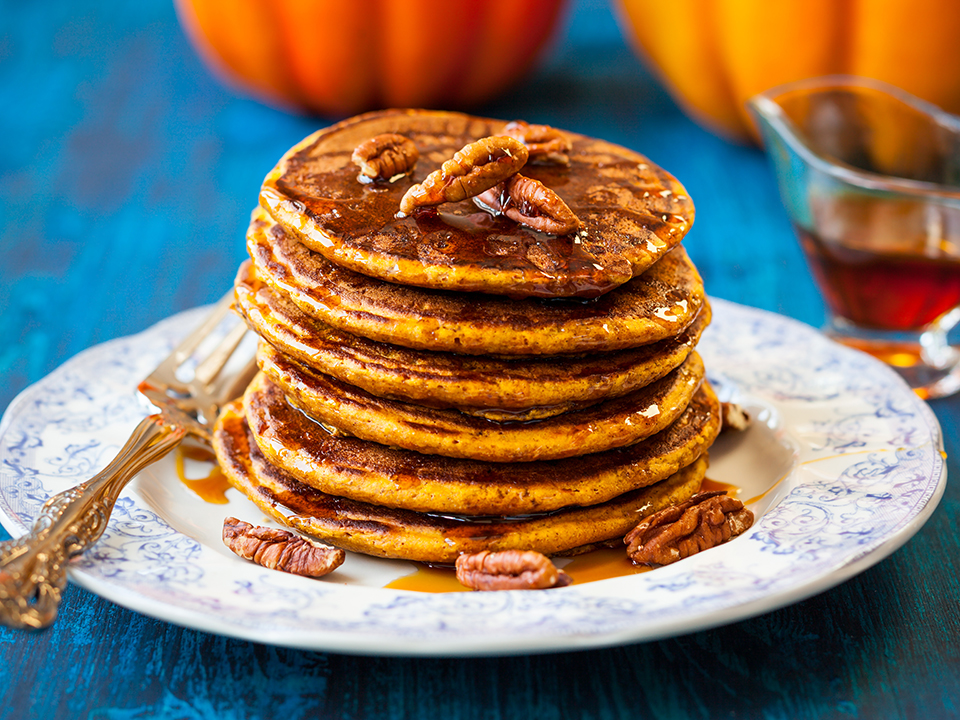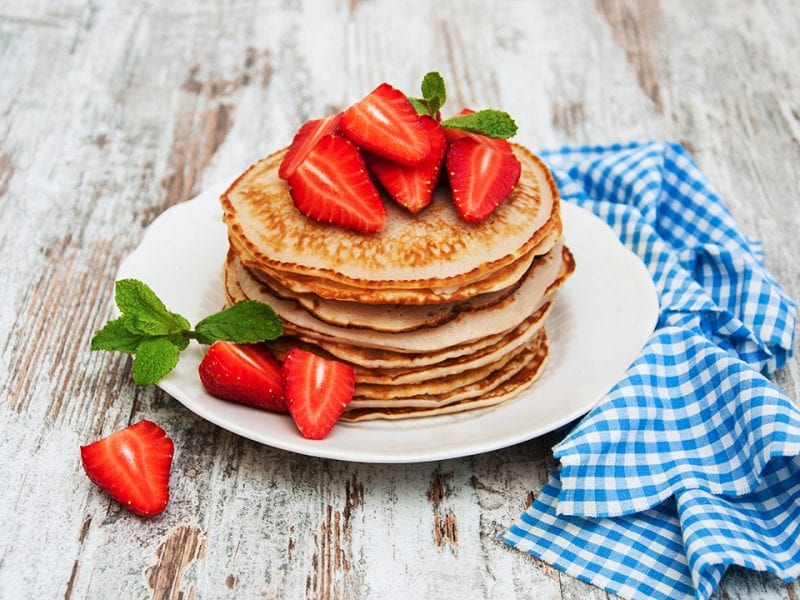Flip yourself a heart happy pancake this Shrove Tuesday
It’s Pancake Day! It would not be Shrove Tuesday without enjoying delicious pancakes with all the toppings: This nevertheless usually means they’re loaded with fat, saturated fat and sugar – perhaps not such a good idea if you’re trying to keep your cholesterol in check and heart happy! Discover Benecol tips for a delicious & heart healthy pancake feast!

We all have our favourites among the delicious combo of batter-based, buttery pancakes, topped with everything from the classic sugar and lemon, to crispy bacon and maple syrup, or even smothered in chocolate spread. This nevertheless usually means they’re loaded with fat, saturated fat and sugar – perhaps not such a good idea if you’re trying to keep your cholesterol in check and heart happy!
But don’t despair! If you need to keep your cholesterol levels on track this Pancake Day, there’s no need to put away your frying pan. With a few tweaks to your ingredients and toppings, you can make your pancakes a heart healthier option – perfect for testing out your cooking and flipping skills in the kitchen!
Here’s a run through of our ‘flippin’ wonderful heart healthy suggestions to see what changes you can make this Shrove Tuesday (Tuesday 16th February):
1. Get creative with your pancakes
Traditionally pancakes are eaten with a sprinkling caster sugar and a squeeze of fresh lemon juice, but Pancake Day is a good excuse to mix it up – to try something new, with new ingredients. There are so many different ways to enjoy the humble pancake – from sweet and savoury pancakes, to fluffy American-style pancakes and paper-thin French crêpes. Why not try our pumpkin pancakes recipe , which includes pumpkin puree for moisture and natural sweetness, warming cinnamon and ginger spices for flavour and whole wheat flour for fibre. You might find that you enjoy this healthier alternative even more than the traditional recipe!
2. Try wholemeal plain flour
Most basic pancake recipes use white plain flour – swap for wholemeal flour, or a 50/50 mix if you don’t fancy going fully wholemeal. Not only will this switch provide a lovely, slightly nutty flavour but it will boost the fibre content and create a more filling pancake. Wholemeal flour packs a fibre punch providing 10 grams of fibre per 100g, compared to 4 grams of fibre in white flour – perfect for helping you reach the new 30g a day fibre target for good gut, heart and overall health. And if you wanting a gluten free option, give pure oats, buckwheat, teff or rice flour a go.
3. Swap out butter for Benecol® buttery taste spread
Butter is high in saturated fat, which can raise your cholesterol levels. Just two teaspoons of butter (10g) provides 5.2g saturated fat – that’s a quarter of the maximum amount you should have each day. So swapping out butter for Benecol® buttery taste spread in your pancake mix is a small change that you can make this Pancake Day, and when made regularly in your daily cooking and baking can quickly add.
Well worth the substitute, each 10g serving of Benecol® buttery spread contains just 1.1g of saturated fat and 0.7g of plant stanols. Did you know that a daily intake of 1.5-2.4g plant stanols can lower your cholesterol by 7-10% in 2-3 weeks, as part of a healthy diet and lifestyle.
4. Don’t stack your pancakes high
Getting to grips with healthy portion sizes is one of the best ways to control your calorie intake and maintain a healthy weight, and as a result, look after your cholesterol. Reducing portion sizes is easier if you use a smaller frying pan (around the 20-24cm mark) – just don’t eat twice as many to compensate! Remember, the more food you have in front of you, the more you’re likely to eat, so don’t pile too many pancakes on your plate either.
5. Cook from scratch where possible
If you’re buying shop bought pancakes, check and compare food labels to make healthier choices. Some food packets also have colour coded nutrition labels – so if you’re trying to eat less saturated fat, avoid those pancakes with a red label for ‘saturates’, and then try to eat mostly ambers and greens for fat, sugars and salt too.
But let’s face it, why settle for shop bought pancakes when they are among the easiest, quickest and most fun foods to make yourself?
6. Invest in a good pan
A quality non-stick pan means you can use less fat, without your pancakes sticking and burning to the pan. This is great news if you are looking after your waistline and your heart health, considering that just one tablespoon (15ml) of oil on average, contains around 135 calories. Switching from saturated fat products like butter, to unsaturated fat products like vegetables oils (e.g. rapeseed and olive oil) can help you manage your cholesterol levels, but even unsaturated oils are still high in calories, so watch how much you use and invest in a good frying pan.
7. Vary your dairy
Using 300ml of skimmed milk instead of whole milk in your traditional pancake mix will save around 80 calories and 7g saturated fat. What’s more, you won’t lose out on any calcium that helps to keep your bones strong. Is it worth the switch? Absolutely, don’t forget that a few tiny tweaks can grow through time, and lead to big changes.
If you are reluctant to use skimmed milk, give semi-skimmed or 1% fat milk a go, or for a plant-based alternative, try oat, almond or soya drinks.
You can lighten up the fat and sat fat load further, by replacing any whipping cream topping for fat free Greek style yogurt, or for a little nudge to push your cholesterol into the right direction, use Benecol® low fat thick and fruity yogurt. Just one pot is an easy way to get your 2.0g of plant stanols, proven to lower cholesterol – so you can still enjoy those celebratory pancakes without guilt.
8. Eat mindfully
The experience of eating pancakes with your family and friends can be just as important, as what’s on your plate. Think about what you’re eating – take time to enjoy the pancakes with each mouthful, savoring the smell, taste and texture, and without any visual distractions. Listen to your body also during the eating experience so that you become more aware of your satiety that guide you to stop when you’re feeling full.
9. Moderation is key
Enjoying an occasional pancake (even a really indulgent one!) is an enjoyable part of life and can fit into a heart healthy diet, as long as you ensure the majority of your meals are nutritious, well-balanced and packed with plant foods such as vegetables, fruit, protein-rich beans, lentils, nuts, seeds, and starchy, fibre-rich foods.
Think about the 80/20 rule – perhaps if you eat healthy, whole foods that are low in saturated fat, salt and sugar most of the time (80% of the time), then it’s OK to occasionally enjoy less healthy foods, including indulging pancakes (20% of the time).
10. Cut down on free sugars
An extra sprinkle of coconut sugar, or another drizzle of honey or agave syrup over your pancakes may seem innocent, but whatever you’ve heard, these are all type of free sugars – the type that we should be cutting down on for the sake of our teeth and our waistlines. As a guide, adults should aim to eat no more than 30g of free sugars per day – that’s around seven sugar cubes[1]. Yet we know from our national dietary surveys that most adults are eating too much sugar – nearly double the recommended target[2].
So, try to limit the amount of added sugar you use and instead sweeten your pancakes naturally by pairing them with chopped fresh fruit, citrus segments, dried fruit, fruit compote, fruit spread or preserve. Or for sweetness without the calories that come with sugars, try swapping a teaspoon of sugar for a teaspoon of granulated low calorie sweetener.
11. Watch the savoury pancakes too
Not everyone has a sweet tooth, which is good for avoiding free sugars, but savoury pancakes can be high in fat, saturated fat and salt, especially if they are made with lots of cheese. So, watch your portions (a portion of cheese is a small matchbox-sized amount), use mature cheeses that have a stronger flavour so you don’t need to eat as much or swap for reduced-fat cheeses such as cottage cheese or low fat cream cheese. And with this in mind, remember that ‘reduced-fat’ doesn’t mean ‘low fat’, and they’re often still high in salt.
12. Get your oats
Oat pancakes have the added extra of beta glucan, a type of soluble fibre that helps to reduce cholesterol absorption. So, why not make up a batch of oat pancakes (and add at least 30g oats per serving) this Pancake day – or any day – an easy way to get one of your 3g of beta glucan to help to lower cholesterol.
Healthier toppings for your pancakes

Pancakes are a blank canvas for heart healthy toppings. Take your pick from some of our savoury and sweet topping ideas:
Mashed or sliced banana
If you have a sweet tooth and you’re feeling particularly peckish, mashed or sliced banana is a delicious and filling addition to your pancakes, without adding free sugars. Plus, bananas are brimming with potassium, a mineral that, among other things, helps to maintain normal blood pressure, when combined with a low salt diet. Sprinkle with a dusting of cinnamon or toasted chopped almonds or hazelnuts for some extra nutty goodness and flavour.
Nut butters
Nut butters, such as almond, cashew or peanut are a tasty topping and a good source of healthy, unsaturated fats, which can help you manage your cholesterol levels, as well as plant protein and fibre to help you feel fuller for longer. Check the ingredients and choose the ones made only from nuts, without added salt, sugar or palm oil. Decorate with your favourite fruits or with grated carrot to keep it savoury.
A scattering of berries such as strawberries, blueberries and blackberries adds natural sweetness and a show stopping finish to a healthier pancake. Plus, they really boost the vitamin c content of your pancakes – helping to support your immune system and keep winter coughs and colds at bay.
Dark chocolate
Sprinkle your pancakes with grated dark chocolate. This gives the impression that your pancake is really chocolately, when in fact it’s a top trick that’s guaranteed to fool even the chocoholics in the house. Look out for dark chocolate with 70% cocoa content or higher. It contains less sugar than milk chocolate and more polyphenols, which are a group of plant compounds linked to improved heart health. And its strong flavour also means you also get away with using less of it.
Smoked salmon
Salmon contains omega-3 fatty acids, which are a type of polyunsaturated fat that our bodies need to support the normal function of the heart. For a savoury twist on the classic pancake, try buckwheat pancakes spread with low fat cream cheese, and topped with slices of smoked salmon and a sprinkling of fresh chives.
Dried fruit
As well as making your pancakes naturally sweeter and more colourful, traditional dried fruit such as apricots, raisins and figs provide fibre and a range of vitamins and minerals. And don’t forget that dried fruit can count towards your 5-A-Day – two dried whole apricots, one tablespoon of raisins (30g) and two dried figs all count as one portion.
Benecol® wishes you a Happy Pancake Day 2021
[1] https://www.nhs.uk/live-well/eat-well/how-does-sugar-in-our-diet-affect-our-health
[1] UK – Public Health England. NDNS Years 9 to 11. Available online: https://www.gov.uk/government/statistics/ndns-results-from-years-9-to-11-2016-to-2017-and-2018-to-2019
